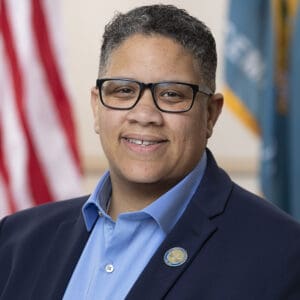

A bill filed in the Delaware House to amend one making its way through the Senate landed on a House committee Wednesday with no advance notice. Photo by Charlie Megginson
A bill to alter the controversial hospital board bill, which is still moving through the Senate, was filed in the Delaware House at 2:55 p.m. Tuesday and showed up unannounced in the House Administration Committee at noon Wednesday morning.
Despite protests from House Minority Leader Mike Ramone, R-Newark/Pike Creek, and Lyndon Yearick, R-Camden, about the speed and non-transparency of the move, the Dem-heavy committee voted it right through.


Mike Ramone
At least the conversations were civil, compared to the verbal brawl in the House two weeks ago when Republicans tried to filibuster the bill and Democrats voted to essentially silence the Republicans to pass Speaker of the House Valerie Longhurst’s House Bill 350.
The rapid move is another example of how determined and how desperate the Democrats in the House and Senate are to get the bill, which would create a board to review and even change hospital budgets, through the legislature in this session while the current power structure is in place.
At issue is a part of the House Bill 350 described as a “cost containment measure.” It would go in place as soon as the bill is signed into law and is expected to be in effect at least two years until the Diamond State Hospital Cost Review Board could get up and running in 2026.
The move would have required hospitals to charge less than 250% of what Medicare will pay for procedures.


Kerri Evelyn Harris
Hospitals revolted, saying that would cost them hundreds of millions and they then would not be able to pay a revenue tax they agreed to under Senate Bill 13. That tax would have unlocked another $100 million in federal funds for Delaware’s Medicaid program.
House Bill 395, sponsored by Rep. Kerri Evelyn Harris, D-Dover, will instead switch the formula and use the core regional Consumer Price Index, plus one point, as the measure against which hospitals may create their charges. The region includes Wilmington, Philadelphia and Camden.
Using the CPI would allow hospitals to grow their budgets, Harris said.
“This growth will be at a rate of the greater of 2% of the previous year’s rate or CPI plus 1%,” Harris said.
Hospitals agreed
Hospitals had agreed to the change, said Brian Frazee, executive director of the Delaware Healthcare Association, a trade group for hospitals.


Lyndon Yearick
Democrats have repeatedly tried to portray hospitals as the largest problem in the rising cost of healthcare for the state and its residents and complained repeatedly that they were not reliable partners in negotiations.
Harris said in the committee Wednesday that she had been made aware that the move to restrict hospital charges using Medicare as the stick would have severely affected Kent and Sussex Hospitals.
“I don’t want to cut services for hospitals,” she said.
Hospital growth also would match health insurance plan rates for 2022, 2023 and 2025, she said.
Yearick wanted to know what the sense of urgency was and why he and Ramone would not given the courtesy of the usual 48-hours between a bill being filed and it showing up in committee.
Harris said hospitals had agreed to things during negotiations and then changed their mind later.
Yearick noted that he, too, lived in Kent County and he didn’t agree that the CPI move was right or helpful.
Longhurst had moved to suspend the committee rules to bring HB 395 through the committee so it could be heard. It wasn’t on the agenda.
RELATED STORY: House Dems silence Republicans to move Speaker’s hospital board bill
RELATED STORY: Hospital board bill could threaten Medicaid’s $100 million new money
RELATED STORY: State moves to control hospital budgets to lower healthcare costs
RELATED STORY: Hospital board bill on to full Senate; deal save Medicaid tax
Ramone noted that they were bringing up modifications to a bill on which Democrats stopped debate and which was still moving through the Senate. He said he never agreed with suspending rules to move legislation.
Ramone — who headed the three-house filibuster — said he had “never really rendered a strong opinion for or against the bill in the first place,” but was more concerned about its consequences.
He said he liked the move to CPI, but felt like it was hypocritical to vote on it when none of the hospital reps were there to comment on it.
There was no public comment, in person or online.
“There are always a lot of really important and urgent items,” Yearick said, “but again, this was released at 2:55 and now we’re suspending rules in the House Admin Committee to hear this today,” he said. “How do you think that reflects on us as a body trying to do good government?”
Longhurst said that the cost containment bill had been one of the hospitals’ biggest issues, had been discussed in public and private and hospitals had agreed with it.
What they didn’t say was that the bill itself could be amended in the Senate, but that would mean it would have to return to the House and face another fight with Republicans. So will Harris’s bill.


Betsy Price is a Wilmington freelance writer who has 40 years of experience.
Share this Post








